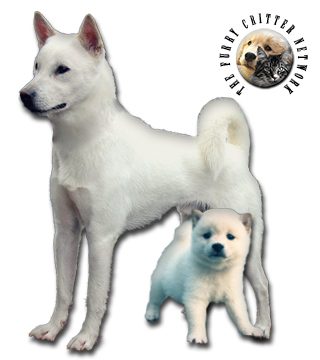Breed Standard
Head: Broad forehead. Rather abrupt stop. Straight nose bridge. Thick, wedge-shaped muzzle. Black nose (flesh color in whites). Tight lips.
Ears: Small, triangular, slightly inclining forward and firmly pricked.
Eyes: Small, slightly triangular, wide set. Dark brown color.
Body: Compact. Thick, muscular neck. Pronounced withers. Deep chest. Belly well tucked up. Broad, muscular loin. Straight, short back.
Tail: Set high. Thick. Carried tightly curled or curved over the back in the shape of a sickle.
Hair: Short, harsh, straight. Slightly longer on the cheeks and tail. Soft, compact undercoat.
Coat: White, red, or brindle
Size: 17 to 22 inches
Weight: 35 lbs to 55 lbs (females usually being the lighter, but not always).
History
Kishu were originally established for hunting wild boar and deer in mountainous Wakayama prefecture. The original breed comprised mostly colored individuals. Approximately 70% of the breed was said to be non-white before the popularity of a primarily white line of Kishu spiked creating the primarily white breed of today.
Behavior
Kishu Ken are a one person/one family dog. They are courageous and brave as hunters, and will be loyal to their owners. They have a strong prey drive, and will hunt small animals. A few have been known to do well with cats if raised with them. They do well with other dogs if socialized well as puppies, however, Kishu may become combative with other dogs who do not respect their boundaries, or become combative with other dogs when frustrated. They are quite headstrong and willful, making training necessary, but they are devoted and loyal to family, getting along well with children, if raised with them. Kishu Ken like to keep an eye on whatever is going on, and sometimes find a high place to look out from. They can be aloof or shy around strangers. They are easily housebroken, intelligent, and strong willed.
The Kishu requires considerable space and exercise. Regular brushing is necessary.
Function
Hunting Dog, Pet.
Health
The Kishu Ken is a fairly healthy dog breed that does not suffer from health conditions common to more popular and refined breeds, but there is still very limited data on the breed in or out of its country of origin. Current data through the public Finnish health database KoiraNet suggests that the Kishu Ken may not be as prone to joint deformities as its sibling breeds, where the majority of tested Kishu Ken have been evaluated as having deformity-free hip joints. Elbows have, thus far, had the least favorable evaluations in the Kishu Ken, and elbow dysplasia may be something to screen for in Kishu Ken as more breed-specific data becomes available.
Instead of physical deformities that cause health issues, Kishu Ken appear to be prone to allergies and autoimmune illnesses or skin conditions. These are not typically life-threatening, but can require lifelong treatment through regulated diet, environmental awareness, allergy medication, or even steroids depending on the individual. In an informal, owner-reported survey of purebred Kishu Ken, environmental allergies appear the most common health condition. Allergies to grass and dust mites have had particular mention. Autoimmune conditions vary, but a handful of individuals have an allergy-like immune response that causes sores and dermatitis which often responds to and is treated with common steroids. Addison's Disease is also noted in the breed, which is an autoimmune condition that causes an error in hormone production in the adrenal glands. Hypothyroidism is also sometimes observed. In dogs, the most common form of hypothyroidism in dogs is caused by an autoimmune condition, and the Kishu may be at particular risk due to the overall autoimmune condition in the breed.
Eyes are another moderate concern in Kishu Ken. The most common deformity of the eye is known as Persistent Pupillary Membranes according to the Finnish health database. This may or may not cause vision impairment, and each dog must be evaluated on a case-by-case basis by a simple eye test. This is not a life-threatening disease and typically requires no treatment. The other known issue is entropion, a genetic defect affecting the eye in which the eyelid turns inward and the lashes scratch the eyeball. This is likely connected in part to the triangular shape of the eye in the Kishu Ken. Entropion requires surgery to prevent the loss of vision in the eye and continual pain to the dog.






